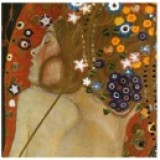Poetic Embodiment
-
sibyllene
17 years agoHello, P and Q at large!
I'm currently taking a seminar on the philosophy of Maurice Merleau-Ponty, a French Phenomenologist writing in about the 1950's. He has theories on the body, language, knowledge, etc., most of which focus around his main theme, which is that of a "lived body."
Unlike traditional western philosophy, which likes to draw a line between the outside, physical world (including the body), and the mind, Merleau-Ponty believes that our mind infuses our body, and cannot be separate from it. Instead of saying "I am my mind, which resides in my body," you would say "I am my body." Furthermore, where normal (Cartesian) philosophical understanding holds that we perceive facts only after receiving and organizing sense data, Merleau-Ponty believes that we cannot perceive at all without our body, and that perception is an instantaneous, instinctual process that takes place prior to any reflection/conscious deconstruction of it. We can understand things intuitively, perhaps, without at first knowing exactly what we're understanding. To understand this, think about how you feel when you have to do a double take. Your body comprehends that there is something different than what you expected to experience, before you ever consciously realized what that difference was. You can look back, and point to the reasons for your reaction, but this categorization of thought is only something that happens afterwards - it's not a part of the original experience. Also, nothing we perceive is free from our own cultural background, personal experience, importance, and meaning. In addition, nothing we perceive is free from our own cultural background, personal experience, importance, and meaning. The way in which we interact with the world is not objective, but shaped and informed by the meaning that we bring to it.
Anyway, my essay is focusing on these theories of his, and how they relate to poetry. I find poetry to be a great example of how people are "lived bodies" existing in the world, and how we seek to describe and evoke those experiences through means that are not necessarily empirical or literal, because scientific descriptions would not do those experiences justice. In Merleau-Ponty's theories on language, he argues that words are not simply "containers" for meanings, that we take in as pieces of sense data and rearrange in order to make a meaning of them. To him, this way of thinking does not account for the way in which we actually experience language. Rather, words (instead of containing meaning) have meaning, at their most basic level. They are the means by which we experience connections with other people. He thinks of words as "verbal gestures," in which we use words in the same way that we use our bodies in the physical world to communicate meaning.
So my question is: what are the experiences of you ladies and gents in regards to poetry? How do you feel when writing it? How does it connect you to the world, in either a literal sense, or otherwise? I know writing descriptive, sensually based poetry often makes me acutely notice the world around me, in ways I hadn't noticed before putting myself in that mind (or noticing my mind in my body?).
Also, how does poetry serve to evoke the meanings you seek? Do you feel that poetry is a way of expressing some "truths" more effectively than scientific, objective investigation might yield? Finally, do you think there's a way of living in the world that is almost entirely poetical? Do you think we can infuse our whole lives with poetry?
Or any other comments. -
Noir
17 years agoWell Merleau-Ponty's theories sounds interesting....
"what are the experiences of you ladies and gents in regards to poetry? How do you feel when writing it? How does it connect you to the world, in either a literal sense, or otherwise?"
As to your question, I think poetry to me anyways, is a first person or a third person's account on their past or present. I write, poetry with a story hidden behind it. As to how it connects me to the world, well, from those experiances alone, most of them, mine and other accounts, I can actually see the world in a different light, from many perspectives, from many eyes. I think poetry is the window to our expression, and the cries within our souls.
"Do you feel that poetry is a way of expressing some "truths" more effectively than scientific, objective investigation might yield?"
I think poetry merely expresses our feelings, biases, prejudices, loves, hates, our thinking. I think we need to distingush between poetry and scientific objectivity, from our interpretation, and from other interpretations. Poetry differs from objectivity, because it comes from a subjective mind, and can be interpreted subjectively. I do think there are some hidden truths in poetry, however, those very truths can be read in different ways from different people living in different experiances.
If you get my meaning... -
sibyllene
17 years agoYes! Thanks for the good response.
I see what you're saying about poetry expressing subjective thoughts, etc. I agree, here. However, this phenomenology asserts that objective, empirical truth does not comprehend the whole of reality (at least as we experience it). For example, an objectivist deconstruction of a book could tell you its height, its material, its weight, etc. But it -couldn't- tell you why the book was culturally significant, or why someone decided to write it, or what it means to you. These things are somewhat non-literal, yes, but they are still a part of reality. Acc. to Merleau-Ponty, at least.
Any thoughts? -
sibyllene
17 years agoMoving Momo's response over as well:
"Not only am I not surprised that you had nothing
original to contribute Nori, but I find it a bit sad that
I know your response by heart by now. You only
rehash everything others say and then crap on it. :)
Having said that, I dont pretend to know loads
about this topic, but I do know that the foundation of
such theories have occurred to me before.
Nevermind the entire theory of perception
or atomic sensations... I have always thought more
that the permanent conditions of experience is
highly interesting. That life is strung together by
individual moments continuing to form our past, our
now and our future, but still existing while being a
ghost of the past and a thought of the future...
Too many thoughts are going thru my head now,
or should I say now... or now... I mean... now!
Sorry. Not making a mockery of this thread,
as I think its a brilliant topic. Finally something to
yank my brain back into action!
So ... does the future and the past actually exist, or is it just a perception of the depth of time from your existing current moment?" -
Noir
17 years ago(Moved from Ddaavidd's post thread...which is about to be deleted I'm guessing)
Not only am I not surprised that you had nothing
original to contribute Nori, but I find it a bit sad that
I know your response by heart by now. You only
rehash everything others say and then crap on it. :)"
Well, there was no questions to answer, seeing as Sibyllene made another thread on it. Its fun to be random...I could say something original, which usually I do, but most of the topics are either rhethorical questions (most of them are from ddavidd, a shame really) or basically answers such as this, that has no solid basis, and from my understanding was already discussed in your "club".... I mean he could make a thread with just sibyllene's question, but then, he complicated it, by giving his own pretentious, illogical and quite funny answer, which he could have done so in your club or pm...whichever serves his odd tastes.
It absoultely makes no sense...but then that is what ddavidd's post is...He's our own eccentric jester we all point and laugh at...Aww! Lol
Ddavidd made a very poor decision actually answering the question, in his long, boring oddly pretentious posts. But I do say that when thinking about the subject of perception. I think Edmund Hasserl's concepts of noesis and noema, fits nicely.
"does the future and the past actually exist, or is it just a perception of the depth of time from your existing current moment?"
I think your question stems from whether time actually exists?
I think time exists merely because we made it so, for example: if we stopped all the clocks...time would stand still because it needs human intervention to be recognised as existing.
The past and the future are measured in the mind. It is not the event itself that is measured, perse, but the impression (past) it leaves on the mind.
The mind expects the future which becomes the present, which the mind attends, and then becomes the past, which the mind remembers....Does that makes sense? -
Noir
17 years agoSibyellene: I'm guessing it's transcendental phenomenology, you're talking about...Lol. I actually think that Merleau, actually sees and would equate objectivity as behaviourism for psychology or mechanism for biology. Merleau from my understanding has only critiqued researches done in his day, psychological (Behaviourism) and biological to be exact, which I could argue has developed the means to improve its objectivity...over the years. I could argue from my understanding at least,that these objectivist theories are the closest and least argued to the truth...in their hayday...
If that makes any sense....
Merleau states that "a word has meaning", but from a behaviourist stance, I could say that words are a response caused by the stimulus, and therefore they have causes, rather than meaning. From my understanding, at least, I would think that most of Merleau's theories focus on the closest to objectivity in his time, which is to say, behaviourist theories etc. But if we actually look at today's closest equivalent to objectivity in psychology, it would be cognitive psychology, which actually started 6 years after Merleau died.
So taking from your example you gave Sibyllene, I could say yes, at the time, an objectivist deconstruction of a book could tell you its height weight etc...However, we can also say that over the years it began making what you define as "non-literal"...literal!
If you get my meaning... -
sibyllene
17 years agoThat does make sense, yeah. There has been a lot of evolution of research methods and thought in the past... 50 or so years? Certainly.
"Merleau states that "a word has meaning", but from a behaviourist stance, I could say that words are a response caused by the stimulus, and therefore they have causes, rather than meaning. "
Merleau-Ponty's big critique, though, was to say that an objectivst understanding of the world sort of.... reversed the order of things. Where a scientist would say "A word is akin to a piece of sense-data, which is taken in by the mind and reconstructed with others to form a coherent thought," (or something? Feel free to add) Merleau-Ponty would say that we comprehend the thought as a whole -first- and intuitively, in sort of a gestahltic sense. It's only upon reflection that we can figure out (scientifically) why those words made sense to us. So, while that might be "what happened," the objective deconstruction is only a partial view of "what happened," and it's not exactly true to us, in the sense that it's not how we experience it.
It's kind of fiddly distinction to make, which he does better than I do, but that's my understanding of it at this point. Annnnnnd, i have to go to class. Cheers. -
Noir
17 years agoLol...I find philosophy, so taxing yet surprisingly easy, seeing as I have to actually work but at the same time easily understand what it's saying....Anyways back to the topic.
Sibyllene:I understand your meaning, and psychology's view on perception, is mostly influenced by Kantian philosophy.
Perception according to cognitive theory, is a set of beliefs. As we grow older, we create a model of how the world works, which we hold as precepts. As new information comes in, our precepts shift. Thus coming to the conclusion that perception is a matter of belief.
Merleau quoted "the dogmatism of science that thinks itself capable of absolute and complete knowledge (truth)". He states that science in its proper context is correct in its findings, but can be misleading if taken from its context.
I think poetry (seeing as we are already discussing it) brings to light Descartes' quote "I doubt, therefore I think, therefore I am" and the idea of dualism...Poets percieve the world as it already is, and express doubt on whether the world truly is universally or culturally or even socially percieved as it does in their own mind.
Dualism on the other hand proposes that the mind controls the body, but that the body can also influence the otherwise rational mind, such as when people act out of passion. And what better experessors of dualism than poets and their poems.
If it makes sense....Lol. -
Noir
17 years agoSo rather than discuss the subject ddavidd at hand and bring new concepts to light, which is poetry and its correlation to Merleau's theories or any other philosophical theories, you summarise and use examples and metaphors to prove nothing?
Sigh... I guess this is to be expected...lol
Anyways back to the topic: Do you think "doubt" plays a key role in poetry...?


